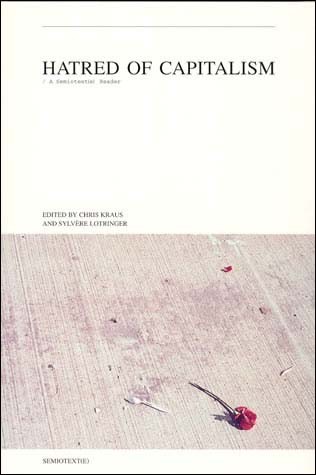Félix Guattari, Suely Rolnik: Molecular Revolution in Brazil (1986–) [BR-PT, ES, EN]
Filed under book | Tags: · abstract machine, body, brazil, cartography, culture, desire, deterritorialization, emotion, energy, history, love, philosophy, politics, psychoanalysis, schizoanalysis, semiotics, sex, subjectivation, subjectivity, unconscious

“Following Brazil’s first democratic election after two decades of military dictatorship, French philosopher Félix Guattari traveled through Brazil in 1982 with Brazilian psychoanalyst Suely Rolnik and discovered an exciting, new political vitality. In the infancy of its new republic, Brazil was moving against traditional hierarchies of control and totalitarian regimes and founding a revolution of ideas and politics. Molecular Revolution in Brazil documents the conversations, discussions, and debates that arose during the trip, including a dialogue between Guattari and Brazil’s future President Luis Ignacia Lula da Silva, then a young gubernatorial candidate. Through these exchanges, Guattari cuts through to the shadowy practices of globalization gone awry and boldly charts a revolution in practice.
Assembled and edited by Rolnik, Molecular Revolution in Brazil is organized thematically; aphoristic at times, it presents a lesser-known, more overtly political aspect of Guattari’s work. Originally published in Brazil in 1986 as Micropolitica: Cartografias do desejo, the book became a crucial reference for political movements in Brazil in the 1980s and 1990s. It now provides English-speaking readers with an invaluable picture of the radical thought and optimism that lies at the root of Lula’s Brazil.”
Originally published as Micropolítica: Cartografias do desejo, Vozes, Petrópolis, 1986.
English edition
Translated by Karel Clapshow and Brian Holmes
Publisher Semiotext(e), Los Angeles 2008
Foreign Agents series
ISBN 1584350512, 9781584350514
495 pages
Review: Aliocha wald Lasowski (Chimères, 2007, FR).
Publisher (EN)
Publisher (ES, Madrid)
Publisher (ES, Buenos Aires)
Micropolítica. Cartografias do desejo (BR-Portuguese, 4th ed., 1984/1996, added on 2017-2-22)
Micropolítica. Cartografías del deseo (Spanish, trans. Florencia Gómez, Madrid ed., 2006, added on 2013-9-26)
Molecular Revolution in Brazil (English, trans. Karel Clapshow and Brian Holmes, 2008, updated on 2017-6-26)
Micropolítica. Cartografías del deseo (Spanish, trans. Florencia Gómez, Buenos Aires ed., 2nd ed., 2006/2013, added on 2020-11-14)
Chris Kraus, Sylvère Lotringer (eds.): Hatred of Capitalism: A Reader (2001)
Filed under book | Tags: · activism, capitalism, cultural resistance, philosophy, subjectivity, theory

“Compiled in 2001 to commemorate the passing of an era, Hatred of Capitalism brings together highlights of Semiotext(e)’s most beloved and prescient works. Founded by French theorist and critic Sylvère Lotringer as a scholarly journal in 1974, Semiotext(e) quickly took on the mission of melding French theory with the American art world and punk underground. Its Foreign Agents, Native Agents, Active Agents and Double Agents imprints have brought together thinkers and writers as diverse as Gilles Deleuze, Assata Shakur, Bob Flanagan, Paul Virillio, Kate Millet, Jean Baudrillard, Michelle Tea, William S. Burroughs, Eileen Myles, Ulrike Meinhof, and Fanny Howe. In Hatred of Capitalism, editors Kraus and Lotringer bring these people together in the same volume for the first time.”
Assistant editors: Shannon Durbin and Tessa Laird
Publisher Semiotext(e), Los Angeles, 2001
Double Agents series
ISBN 1584350121, 9781584350125
421 pages
Review: Brian Dillon (Mute, 2002).
Interview with editor (Leo Edelstein, Log, 2001).
PDF (12 MB, updated on 2019-2-25)
Comment (0)Michel Foucault: The Politics of Truth (1997/2007)
Filed under book | Tags: · christianity, critique, enlightenment, ethics, hermeneutics, marxism, ontology, phenomenology, philosophy, politics, revolution, self, subjectivity, truth

“In 1784, the German newspaper Berlinische Monatschrifte asked its audience to reply to the question ‘What is Enlightenment?’ Immanuel Kant, following Moses Mendelssohn, took the opportunity to investigate the purported truths and assumptions of his ‘age of reason.’ Two hundred years later, Michel Foucault released a response to Kant’s initial essay, positioning the philosopher as the initiator of the discourse, and critique, of modernity—a credit traditionally accredited to Nietzsche. The Politics of Truth takes this initial encounter between these two philosophers, Foucault and Kant, as the framework around which these different lectures and unpublished essays are assembled. Ranging from reflections on the Enlightenment and revolution to a consideration of the Frankfurt School, this collection offers insight into the topics preoccupying Foucault as he worked on what would be his last body of published work, the three volume History of Sexuality. Foucault’s examination of Kant’s “What is Enlightenment?” is the most “American” moment of Foucault’s thinking. It is in America that he realized the necessity of tying down his own reflection to that of the Frankfurt School. Edited by Sylvère Lotringer, The Politics of Truth contains transcripts of lectures Foucault gave in America and France between 1978 and 1984, the year of his death.”
Edited by Sylvère Lotringer
Introduction by John Rajchman
Translated by Lysa Hochroth and Catherine Porter
Publisher Semiotext(e), 2007
Foreign Agents series
ISBN 1584350393, 9781584350392
195 pages
PDF (13 MB, updated on 2017-6-26)
Comment (0)
